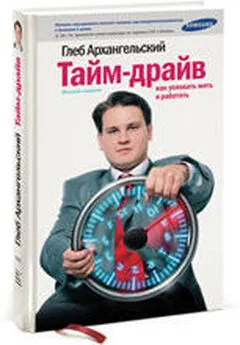Ричард convertfileonline.com - _2016_02_09_21_40_03_404
- Название:_2016_02_09_21_40_03_404
- Автор:
- Жанр:
- Издательство:Манн, Иванов и Фербер
- Год:2016
- ISBN:9785000577332
- Рейтинг:
- Избранное:Добавить в избранное
-
Отзывы:
-
Ваша оценка:
Ричард convertfileonline.com - _2016_02_09_21_40_03_404 краткое содержание
_2016_02_09_21_40_03_404 - читать онлайн бесплатно полную версию (весь текст целиком)
Интервал:
Закладка:
[19]Robert Fogel, The Fourth Great Awakening and the Future of Egalitarianism. Chicago: University of Chicago Press, 2000.
Глава 5
[1]Личные интервью и беседы автора, 2000–2001 годы.
[2]Richard Florida and Martin Kenney, The Breakthrough Illusion. New York: Basic Books, 1990.
[3]US Department of Labor, Bureau of Labor Statistics, Employee Tenure 2010, September 14, 2010, available online at www.bls.gov/news.release/tenure.nr0.htm.
[4]“The End of the Job,” Fortune (cover story), September 19, 1994.
[5]Alan Burton Jones, Knowledge Capitalism: Business, Work and Learning in the New Economy. Oxford: Oxford University Press, 1999, p. 48.
[6]Daniel Pink, Free Agent Nation: How America’s New Independent Workers Are Transforming the Way We Live. NewYork: WarnerBooks, 2001 (издана на русском языке: Пинк Д. Нация свободных агентов. М. : Секрет фирмы, 2005).
[7]Sara Horowitz, “The Freelance Surge Is the Industrial Revolution of Our Time,”Atlantic Online, September 1, 2001, at www.theatlantic.com/business/archive/2011/09/the-freelance-surge-is-the-industrial-revolution-of-our-time/244229/.
[8]Mickey Butts, “Let Freedom Ring,” рецензия на книгу Дэниела Пинка «Нация свободных агентов»: Dan Pink, Free Agent Nation: The Industry Standard, April 30, 2001, p. 77.
[9]См. Helen Jarvis and Andy C. Pratt, “Bringing It All Back Home: The Extensification and Overflowing’ of Work: The Case of San Francisco’s New Media Households,” Geoforum 37: 331–339.
[10]Ross Perlin, Intern Nations: How to Earn Nothing and Learn Little in the New Economy (London: Verso, 2011).
[11]William H. Whyte Jr., The Organization Man. New York: Simon and Schuster, 1956.
[12]Denise Rousseau, “The Idiosyncratic Deal: Flexibility Versus Fairness?” Organizational Dynamics 29 (4) (Spring 2001): 260–273; “The Boundaryless Human Resource Function: Building Agency and Community in the New Economic Era,” Organizational Dynamics 27 (4) (Spring 1999): 6–18; and Idiosyncratic Employment Arrangements: When Workers Bargain for Themselves. Armonk, NY: W. E. Sharpe, 2002.
[13]Rosemary Batt, Susan Christopherson, Ned Rightor, and Danielle Van Jaarsveld, Net Working: Work Patterns and Workforce Policies for the New Media Industry. Washington, DC: Economic Policy Institute, 2001.
[14]Jeffrey Pfeffer, цитата из рецензии на книгу Дэниела Пинка: Daniel Pink, “Not Holding a Job Is the New Work System,” New York Times, May 27, 2001. См. также Pfeffer, “Fighting the War for Talent Is Hazardous to Your Organization’s Health,” Organizational Dynamics 29 (4) (Spring 2001): 248–259.
[15]Jeremy Rifkin, The End of Work: The Decline of the Global Labor Force and the Dawn of the Post-Market Era. New York: Putnam, 1995; Stanley Aronowitz and Wil DeFazio, The Jobless Future: Sci-Tech and the Dogma of Work. Minneapolis: UniversityofMinnesotaPress, 1994. Второе, переработанное и дополненное, издание этой книги было опубликовано в 2010 году.
[16]Jill Andresky Fraser, White-Collar Sweatshop: The Deterioration of Work and Its Rewards in Corporate America. New York: W. W. Norton, 2001.
[17]Richard Sennett, The Corrosion of Character: The Personal Consequences of Work in the New Capitalism. NewYork: W. W. Norton, 1998 (издана на русском языке: Сеннет Р. Коррозия характера. М. : Фонд социально-прогностических исследований «Тренды», 2014).
[18]Gideon Kunda, Stephen R. Barley, and James A. Evans, “Why Do Contractors Contract? The Experience of Highly Skilled Technical Professionals in a Contingent Labor Market,” Industrial and Labor Relations Review, 2001.
[19]Stephen Barley, The New World of Work. London: British North American Committee, 1996. Лоуренс Фридман утверждает, что практически все основные экономические и социальные институты переходят к горизонтальной структуре; см.: TheHorizontalSociety. New Haven: Yale University Press, 1999.
[20]Joanne Ciulla, The Working Life: The Promise and Betrayal of Modern Work. New York: Times Books, 2000, p. 230.
[21]Batt et al., Net Working.
[22]Результаты опроса об удовлетворенности работой, который был проведен Lucent Technologies в феврале 2001 года с участием 262 специалистов по сетевым технологиям.
[23]Barbara Ehrenreich, Bait and Switch: The (Futile) Pursuit of the American Dream. New York: Holt, 2005.
[24]Sara Horowitz, Atlantic Online, September 1, 2001, “The Freelance Surge Is the Industrial Revolution of Our Time; статья доступна на сайте: www.theatlantic.com/business/archive/2011/09/the-freelance-surge-is-the-industrial-revolution-of-our-time/244229/.
Глава 6
[1]“Geek Chic,” Wall Street Journal, September 7, 2000.
[2]См., например: Scott Omellanuk, “Survival Strategies for the Casual Office,” Wall Street Journal, June 23, 2000.
[3]Stephanie Armour, “Companies Rethink Casual Clothes,” USA Today, June 27, 2000.
[4]Из личного интервью, зима 2001 года.
[5]Эти данные взяты из следующего источника: Lonnie Golden, “Flexible Work Schedules: What Are We Trading Off to Get Them?” Monthly Labor Review (March 2001): 50–67.
[6]Terrence McMenamin, “A Time to Work: Recent Trends in Shift Work and Flexible Schedules”, Monthly Labor Review (December 2007): 3–15, at www.bls.gov/opub/mlr/2007/12/art1full.pdf.
[7]См. Phillip Rones, Randy Ilg, and Jennifer Gardner, “Trends in Hours of Work Since the Mid–1970s,” Monthly Labor Review (April 1997): 3–14.
[8]Allison Arieff, “It’s Not About the Furniture: Cubicles, Continued,” New York Times, Opinionator Blog, August 22, 2011; http://opinionator.blogs.nytimes.com/2011/08/22/its-not-about-the-furniture-cubicles-continued/.
[9]Deborah Schoeneman, “Can Google Come Out to Play?” New York Times, December 31, 2006.
[10]Jane Jacobs, The Death and Life of Great American Cities. New York: Random House, 1961; цит. по: Modern Library Edition, p. 245.
[11]Thomas Allen, Managing the Flow of Technology. Cambridge: MIT Press, 1977.
[12]См. Claudia Deutsch, “New Economy: IBM and Steelcase Lay Out Their Vision of the Office of the Future,” New York Times, January 14, 2001.
[13]См. Malcolm Gladwell, “Designs for Working: Why Your Bosses Want to Turn Your Office into Greenwich Village,” New Yorker, December 8, 2000, pp. 60–70; цитаты взяты со страниц 62, 64–65. См. также Jeffrey Huang, “Future Space: A New Blueprint for Business Architecture,” Harvard Business Review (April 2001): 149–157.
[14]“John Seely Brown Interview,” by Michael Schrage, Wired, August 2000. См. также John Seely Brown and Paul Duguid, The Social Life of Information. Boston: Harvard Business School Press, 2001.
[15]William H. Whyte Jr., The Organization Man. New York: Simon and Schuster, 1956, p. 446.
[16]См. Richard Florida, “Science, Reputation and Organization,” Carnegie Mellon University, Pittsburgh, PA, неопубликованный рабочий доклад, January 2000. Scott Stern, “Do Scientists Pay to Be Scientists?” Management Science 50 (6) (June 2004): 835–853; Michelle Gittelman and Bruce Kogut, “Does Good Science Lead to Valuable Knowledge? Biotechnology Firms and the Evolutionary Logic of Citation Patterns,” Management Science 49 (4) (2003): 366–382.
[17]Richard Lloyd, Neo-Bohemia: Art and Commerce in the Postindustrial City. New York: Routledge, 2006.
[18]Arlie Russell Hochschild, The Time Bind: When Work Becomes Home and Home Becomes Work. New York: Henry Holt, 2000.
[19]Lydia Saad, “American Workers Generally Satisfied, but Indicate Their Jobs Leave Much to Be Desired,” Gallup News Service, September 3, 1999, at http://www.gallup.com/poll/3616/american-workers-generally-satisfied-indicate-their-jobs-leave.aspx.
[20]The Towers Perrin Talent Report: New Realities in Today’s Workplace. New York: Towers Perrin, 2001/
[21]См.: Peter Drucker, “Management’s New Paradigm,” Forbes 7, October 5, 1998, pp. 152–177.
[22]Michelle Conlin, “Job Security, No. Tall Latte, Yes,” Business Week, April 2, 2001, p. 63.
[23]См. Rick Levine, Christopher Locke, Doc Searls, and David Weinberger, The Cluetrain Manifesto: The End of Business as Usual. Cambridge: Perseus Books, 2000.
[24]Цит. по: Christine Canabou, “The Sun Sets on the Bohemian Workplace,” Fast Company, August 2001; http://www.fastcompany.com/64538/sun-sets-bohemian-workplace.
[25]Личные интервью и беседы с автором, 1999–2000 годы.
[26]Цит. по: “Danger: Toxic Company,” Fast Company, November 19, 1998, p. 152; см. также: Jeffrey Pfeffer, The Human Equation: Building Profits by Putting People First. Boston: Harvard Business School Press, 1998 (издана на русском языке: Пфеффер Дж. Формула успеха в бизнесе. На первом месте — люди. М. : Вильямс, 2006).
[27]Teresa Amabile and Steven Kramer, “Do Happier People Work Harder?” New York Times, September 3, 2011.
Глава 7
[1]Классические работы по этой теме: E. P. Thompson, “Time, Work-Discipline, and Industrial Capitalism,” Past and Present 88 (1967); David Landes, Revolution in Time: Clocks and the Making of the Modern World. Cambridge: Harvard University Press, 1983; Sebastian De Grazia, Of Time, Work and Leisure. New York: Twentieth Century Fund, 1962. См. также: Stephen Jay Gould, Time’s Arrow, Time’s Cycle: Myth and Metaphor in the Discovery of Geological Time. Cambridge: Harvard University Press, 1987; Stephen Hawking, A Brief History of Time: From the Big Bang to Black Holes. New York: Bantam Books, 1988; Robert Levine, A Geography of Time. New York: Basic Books, 1997; J. David Lewis and Andrew Wiegert, “The Structure and Meanings of Social Time,” Social Forces 60 (2) (December 1981); Frank Dubinskas, ed., Making Time: Ethnographies of High-Tech Organizations. Philadelphia: Temple University Press, 1988. Joanne Ciulla, The Working Life: The Promise and Betrayal of Modern Work. New York: Times Books, 2000, provides a very good overview of these concepts.
Читать дальшеИнтервал:
Закладка:






